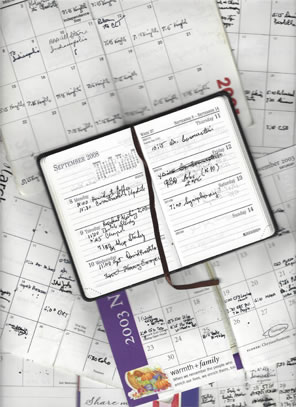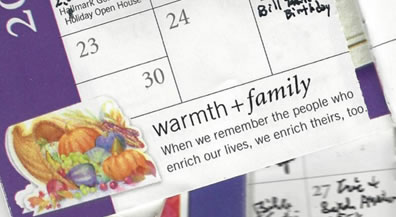A Ghost Story
The Real-Life Drama of The Executor
 Hamlet and his father's ghost have been much on my mind the past few weeks. I haven't seen the two in person in more than a year, but I've felt a lot of kindred spirituality with Hamlet because, as executor of my father's estate, I'm suffering the slings and arrows of outrageous hassles over a paltry fortune. To reach $20,000 in estate value or not to reach $20,000, that is the question, as of this writing. Meanwhile, I'm working through all of Dad's and Mom's stuff—you know, the papers and letters and cards and photographs and weird things your parents kept.
Hamlet and his father's ghost have been much on my mind the past few weeks. I haven't seen the two in person in more than a year, but I've felt a lot of kindred spirituality with Hamlet because, as executor of my father's estate, I'm suffering the slings and arrows of outrageous hassles over a paltry fortune. To reach $20,000 in estate value or not to reach $20,000, that is the question, as of this writing. Meanwhile, I'm working through all of Dad's and Mom's stuff—you know, the papers and letters and cards and photographs and weird things your parents kept.
Not a valid comparison, right? Hamlet is dealing with his father's murder and mother's over-hasty marriage to the murderer while I'm dealing with life insurance companies, banks, and government regulations. Well, my current duties would have fallen on Gertrude, Hamlet's mother, which could explain why she married her brother-in-law so fast so that she wouldn't have to deal with the estate executor headaches. When he meets his father's ghost, Hamlet learns of the murder, and then his dear old dad tells him to avenge that murder, putting his son in a precarious situation. If I could meet my dad's ghost, I'd learn of him what in eternal blazon are these insurance policies he never mentioned or listed, and why didn't he include contingent beneficiaries? After all, my dear old dad made me executor of his will, putting me in such a provocative situation. Hamlet has no easy task figuring out how to kill his uncle, now king, without falling afoul of the court; yeah, but I have to navigate a legal system that automatically distrusts me, causing more obligations and their consequential time and money spent.
Naturally, I want to go all Hamlet and vent here. He gives you five soliloquies; I'd make you sit through six. He rages that his too too solid flesh would melt, thaw, and resolve itself into a dew. I rage that it will be more than two years before we can resolve an estate that has no contention (except that I'm not a resident of the state where Dad lived and died) and that my father actually set up his finances to be transitioned to his sons with maximum ease (though he apparently forgot those insurance policies). "Oh, what a rogue and peasant slave am I," knowing I've got it easy compared to the majority of executors, and that just makes me rage all the more at the general inanity of it all. "Suit the action to the word, the word to the action," Hamlet preaches to the players. "If you truly love someone, don't make them your executor," I tweeted to my followers.
I have the venue here to vent like Hamlet, but probably not the audience: The Executor probably wouldn't be a blockbuster hit lasting 400 years, though settling the paltry estate feels like it might. Unless you think of it as a ghost story: Then, it's a doozy—or, at least a woozy, which is how I'm feeling these days.
Hamlet actually sees two ghosts of his father. One, so corporeal it is listed in the dramatis personae, is the specter that haunts Elsinore. The other ghost is not nearly as famous but is the more omnipresent spirit, though it gets scant mention in the play. "My father," Hamlet says, "methinks I see my father." A startled Horatio asks, "O, where, my lord?" "In my mind's eye, Horatio," Hamlet replies, the verse structure suggesting bemusement on the part of the prince. On stage, this interchange elicits a laugh depending on how both Horatio and the guard, Marcellus, react to Hamlet saying he sees his father, as the two of them saw his dead father walking the battlements the night before.
The father "in my mind's eye" is the one that haunts most of us. While some people encounter the spirits of loved ones and friends in dreams, visions, or other supernatural manner, the more common engagement is through a toggled memory, beyond recalling a particularly fond (or not so fond) moment. Sorting through my parents' file cabinet and boxes, I keep finding Dad's pocket calendars. He used them religiously—and kept them all, as I've now learned (each with his ID and key contacts, so I'm doing a lot of shredding). With each calendar I unearth, in my mind's eye I see Dad thumbing through his calendar to check the week ahead or scribble in an appointment. He has a contentment and pride in his visage, his life well ordered. "I saw him once; he was a goodly king," Horatio says of the father Hamlet sees in his mind's eye; and, like Hamlet, Horatio is seeing a visage as much as a specific event.
This mind's eye is not always peering into the past, either. I had a visitation from my mother once—in my mind's eye. After she passed away in 2007, I worked through the many boxes of stuff still sitting in storage sheds after they moved from their home to a retirement community apartment the year before. A half dozen tall dishpacks contained artificial plants in pots and baskets. Mom liked to decorate her home in foliage, changing not just with each season but each monthly theme; however, she didn't dare use real flowers because they were dirty and required more tending (she was a neat freak). Their new small place couldn't handle all that artificial nature, and Dad wanted to "simplify" their home after Mom's passing, so I was removing all the flowers and plants from their styrofoam soil in order to donate them to the community craft shop. Mom didn't turn in her grave—she was cremated, after all—but she did show up in my mind's eye to give me a what-for, and we argued as I unpacked and disassembled each plant. I know, you can't reason with a memory, but I stood my ground.
Mom's been showing up this week, too, as I now go through the stuff in her home office, and we've had more discussions. I refused to keep the box of countless Ty Beanie Baby labels she cut off the critters that adorned her house (in addition to the thousands of teddy bears and other plush animals—my mom was obsessive compulsive). Then, when I pulled out the bag of string fragments—pieces of twine, yarn bits, and various single shoe strings—I again shook my head in disbelief. However, that bag hasn't gone in the trash yet, as Mom keeps harping at me that "you never know when you might need one." Really, Mom? But she's right, at least from her perspective. They stored categories of paperwork in large manila envelopes, and one such envelope had the return address of their childhood church. By virtue of their chronology, that envelope was at least 20 years old and probably twice that when Dad used it to store some of his e-mails. That find among so many in the boxes this week was quintessential Mom and Dad, as I can see him printing out an e-mail, reading it again—he had already read it on the screen—and putting it in an envelope his wife hadn't thrown away over four decades in eight different homes (yes, Dad printed out every e-mail and kept them all, two decades' worth: I have a lot of shredding to do).
After his stroke, Dad had four favorite activities: reading and printing out e-mailed correspondences and newsletters, watching TV, sitting at the assisted living unit's elevator during shift change, and tending to his iMac calendar, as he couldn't use his pocket calendars anymore. Ay, there's the rub. The ghost haunting me most this week is not that of a dead man. Every time I find yet another one of Dad's pocket calendars, my mind's eye, in addition to seeing Dad use it, also glances at the man laboriously working his mouse and tapping on his keyboard, deleting and retyping several times, to enter his next of many various doctors' appointments. His visage is still of pride and contentment, despite the effort (and I should note here that, a year after his stroke when Dad had his computer hacked, we got him an iMac to provide him more security and me more competency as his IT help; that meant, at 82 and debilitated by the stroke, he had to learn a new computer environment, which he did, mastering it well).
You see, all of these boxes and files I'm going through now don't date from this past March when Dad died; they date from February 2010 when he had his stroke. Six months after that when it was clear he wouldn't regain enough independent-living skills to move back to his apartment, we packed everything up and relinquished Mom and Dad's 16th home together. While the furniture and Mom's many extensive collections went the way of family inheritances and donations, all of the family papers and mementos went into boxes and took up residence in our spare bedroom until we could "get to it later." Later has come, now that I have to account for all important estate documents.
Going through all their stuff, I'm not just reliving a joyous life with Dad and Mom: I'm reliving those two months I spent in Dad's hospital rooms, his time in rehabilitation, and my adjusting to the new Dad as he adjusted to his new life. In one box I came across an on-line order for new pants and shoes, and I could see him excitedly push "enter" on his keyboard, even though I wasn't there when he did it; but I was there when the pants and shoes arrived and he was in the hospital. I come across evidence of his involvement in many of the retirement community's committees and activities, and the work he did as official photographer, but what I see is me filling in for him as photographer at a resident's 100th birthday party the afternoon after he had brain surgery that morning.
What finally forced me to pause in unpacking all this stuff was when I came across a blank envelope. Inside was a birthday card to my brother Deano (the one who provides the caricatures for Shakespeareances.com). Dad made his own greeting cards on the computer, customizing them with a photo of the recipient and his own personally specific message. Looking at Deano's card, my mind's eye saw Dad print it out, proudly look at the photograph of Deano he used, reread the message he composed, and then insert the card in the envelope. However, another part of my mind was doing the math, how Dad, self-disciplined as he was, would mail these cards seven days before the celebratory day. I realized he made this card the day of the stroke, perhaps, even (again, knowing his habits) inserting it in the envelope just minutes before he started feeling nauseous and then his world spun out of his control.
"What a piece of work is a man!" Hamlet says: "How noble in reason! How infinite in faculty!" Well, not so infinite, as it turns out.
 There's a lesson in all this—maybe many; I'm just not sure what they are. I've been asking myself a lot of questions this week as I go through Mom and Dad's stuff and engage with their ghosts. What are the real consequences of "get to it later," especially when "later" might be—likely will be—a completely different state of being? How much do we appreciate what we have—really take the time to visually, physically, intellectually enjoy what we have—rather than gathering up more stuff and filing it all away as memories for someone else to puzzle over? Instead of merely cursory condolences accompanying yet another hurdle, is there some way insurance and government bureaucracies can accept my trustworthiness based on the fact that I've been executor in Mom's and Dad's wills as far back as 1983 when I was 25, that I have had their powers of attorney for 20 years, and I have been a constant presence for Dad and managing his estate for the past six years with the merited trust of not just him but the rest of the family? My middle brother, John, was executor for the few years he happened to be living in the same neighborhood as Mom and Dad, and then he moved and Mom and Dad rewrote their wills to reinstate me as executor: Why did John have to get a better job in another city? That's the question I ask most frequently, though it always prompts an immediate answer: I wouldn't wish this experience on anybody I love. That, in turn, has prompted a more urgent question: What measures do I need to take now, in addition to dropping my life insurance policy, to keep my wife and sons from the hassles I'm enduring (Sarah marrying one of her brothers-in-law is not a likely option)?
There's a lesson in all this—maybe many; I'm just not sure what they are. I've been asking myself a lot of questions this week as I go through Mom and Dad's stuff and engage with their ghosts. What are the real consequences of "get to it later," especially when "later" might be—likely will be—a completely different state of being? How much do we appreciate what we have—really take the time to visually, physically, intellectually enjoy what we have—rather than gathering up more stuff and filing it all away as memories for someone else to puzzle over? Instead of merely cursory condolences accompanying yet another hurdle, is there some way insurance and government bureaucracies can accept my trustworthiness based on the fact that I've been executor in Mom's and Dad's wills as far back as 1983 when I was 25, that I have had their powers of attorney for 20 years, and I have been a constant presence for Dad and managing his estate for the past six years with the merited trust of not just him but the rest of the family? My middle brother, John, was executor for the few years he happened to be living in the same neighborhood as Mom and Dad, and then he moved and Mom and Dad rewrote their wills to reinstate me as executor: Why did John have to get a better job in another city? That's the question I ask most frequently, though it always prompts an immediate answer: I wouldn't wish this experience on anybody I love. That, in turn, has prompted a more urgent question: What measures do I need to take now, in addition to dropping my life insurance policy, to keep my wife and sons from the hassles I'm enduring (Sarah marrying one of her brothers-in-law is not a likely option)?
One answer came without a question: How fragile is life. One moment you're taking a nap in your garden or making a birthday card for your son, and the next thing you know you are in purgatory or intensive care. Upon finding Deano's unsent birthday card, I e-mailed the family, sharing what I had just experienced and urging them all to "Shower the people you love with love." I blatantly stole that line from James Taylor, but the ghost's message was delivered.
Eric Minton
September 1, 2016
Comment: e-mail [email protected]
Start a discussion in the Bardroom



 Find additional Shakespeareances
Find additional Shakespeareances